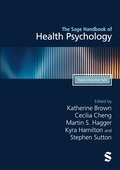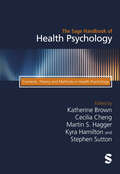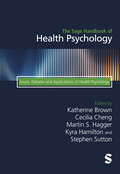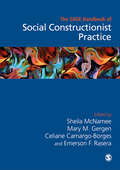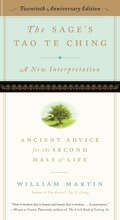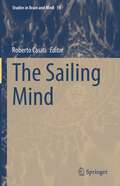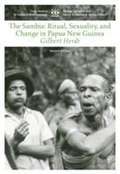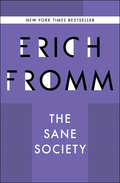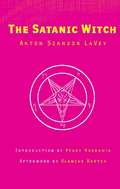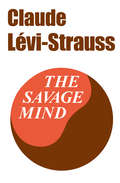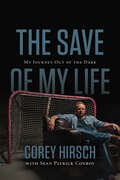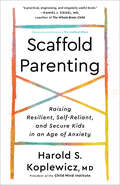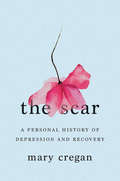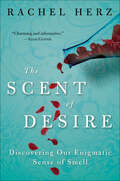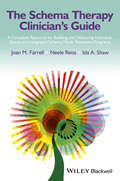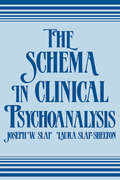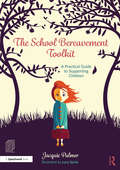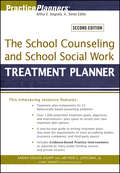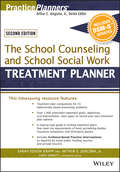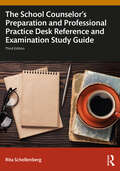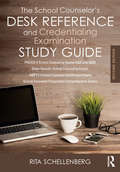- Table View
- List View
The Sage Handbook of Health Psychology
by Katherine Brown Martin Hagger Stephen Sutton Kyra Hamilton Cecilia ChengThe field of health psychology has undergone transformative growth and development over the past 20 years This two-volume set captures the evolution of the field, providing a comprehensive and up-to-date reference for researchers, practitioners, and students. Each volume delves into critical aspects of health psychology, from foundational theories and methods to practical applications and interventions. This set is essential reading for those seeking to understand and apply health psychology principles to improve health and wellbeing outcomes. Volume One: Contexts, Theory, and Methods in Health Psychology The Sage Handbook of Health Psychology, 2e Volume One: Contexts, Theory and Methods in Health Psychology is focused on the foundational contexts, theories, and methods that underpin health psychology today. The Handbook covers diverse perspectives, including socio-political, cultural, and ethical issues, and provides an in-depth exploration of biological health psychology, theories of health-related behavior, and advanced research methodologies. Essential for postgraduate students, researchers, and practitioners, this Handbook offers a comprehensive overview of the current state of research and knowledge in health psychology. Section One: Contexts and Perspectives Section Two: Theories of Health-Related Behavior Section Three: Biological Health Psychology: Theories and Approaches Section Four: Methods and Measurement in Health Psychology Volume Two: Issues, Debates and Applications of Health Psychology The Sage Handbook of Health Psychology, 2e Volume Two: Issues, Debates andApplications of Health Psychology covers the practical applications of health psychology, addressing intervention development, health improvement strategies, mental health and wellbeing, health protection, and the integration of health psychology into policy and professional practice. With contributions from leading experts, this is an indispensable resource for those looking to apply health psychology principles to real-world challenges. This Handbooks is a must-read for postgraduate students, researchers, and practitioners aiming to improve health and wellbeing outcomes through evidence-based practices. Section One: Issues and Debates in Health Psychology Section Two: Intervention Development Approaches Section Three: Health Improvement Interventions and Preventive Behaviors Section Four: Improving Mental Health and Wellbeing Section Five: Health Protection Interventions and Long-term Conditions Section Six: Health Psychology in Practice
The Sage Handbook of Health Psychology: Contexts, Theory and Methods in Health Psychology
by Katherine Brown Martin Hagger Stephen Sutton Kyra Hamilton Cecilia ChengThe Sage Handbook of Health Psychology, 2e Volume One: Contexts, Theory and Methods in Health Psychology is focused on the foundational contexts, theories, and methods that underpin health psychology today. The Handbook covers diverse perspectives, including socio-political, cultural, and ethical issues, and provides an in-depth exploration of biological health psychology, theories of health-related behavior, and advanced research methodologies. Essential for postgraduate students, researchers, and practitioners, this Handbook offers a comprehensive overview of the current state of research and knowledge in health psychology. Section One: Contexts and Perspectives Section Two: Theories of Health-Related Behavior Section Three: Biological Health Psychology: Theories and Approaches Section Four: Methods and Measurement in Health Psychology
The Sage Handbook of Health Psychology: Contexts, Theory and Methods in Health Psychology
by Katherine Brown Martin Hagger Stephen Sutton Kyra Hamilton Cecilia ChengThe Sage Handbook of Health Psychology, 2e Volume One: Contexts, Theory and Methods in Health Psychology is focused on the foundational contexts, theories, and methods that underpin health psychology today. The Handbook covers diverse perspectives, including socio-political, cultural, and ethical issues, and provides an in-depth exploration of biological health psychology, theories of health-related behavior, and advanced research methodologies. Essential for postgraduate students, researchers, and practitioners, this Handbook offers a comprehensive overview of the current state of research and knowledge in health psychology. Section One: Contexts and Perspectives Section Two: Theories of Health-Related Behavior Section Three: Biological Health Psychology: Theories and Approaches Section Four: Methods and Measurement in Health Psychology
The Sage Handbook of Health Psychology: Issues, Debates and Applications of Health Psychology
by Katherine Brown Martin Hagger Stephen Sutton Kyra Hamilton Cecilia ChengThe Sage Handbook of Health Psychology, 2e Volume Two: Applications of Health Psychology covers the practical applications of health psychology, addressing intervention development, health improvement strategies, mental health and wellbeing, health protection, and the integration of health psychology into policy and professional practice. With contributions from leading experts, this is an indispensable resource for those looking to apply health psychology principles to real-world challenges. This Handbooks is a must-read for postgraduate students, researchers, and practitioners aiming to improve health and wellbeing outcomes through evidence-based practices. Section One: Issues and Debates in Health Psychology Section Two: Intervention Development Approaches Section Three: Health Improvement Interventions and Preventive Behaviors Section Four: Improving Mental Health and Wellbeing Section Five: Health Protection Interventions and Long-term Conditions Section Six: Health Psychology in Practice
The Sage Handbook of Health Psychology: Issues, Debates and Applications of Health Psychology
by Katherine Brown Martin Hagger Stephen Sutton Kyra Hamilton Cecilia ChengThe Sage Handbook of Health Psychology, 2e Volume Two: Applications of Health Psychology covers the practical applications of health psychology, addressing intervention development, health improvement strategies, mental health and wellbeing, health protection, and the integration of health psychology into policy and professional practice. With contributions from leading experts, this is an indispensable resource for those looking to apply health psychology principles to real-world challenges. This Handbooks is a must-read for postgraduate students, researchers, and practitioners aiming to improve health and wellbeing outcomes through evidence-based practices. Section One: Issues and Debates in Health Psychology Section Two: Intervention Development Approaches Section Three: Health Improvement Interventions and Preventive Behaviors Section Four: Improving Mental Health and Wellbeing Section Five: Health Protection Interventions and Long-term Conditions Section Six: Health Psychology in Practice
The Sage Handbook of Social Constructionist Practice
by Mary M. Gergen Sheila McNamee Celiane Camargo-Borges Emerson F. RaseraThe SAGE Handbook of Social Constructionist Practice is the first major survey of innovations in professional practice emerging from a social constructionist orientation to social science. This key perspective has been unique in its stimulation of pioneering practices over a broad number of professions. This volume offers insights into the latest developments in theory, showcases the range and variations in practical outcomes, while pointing to emerging directions of development. The Handbook focuses on hands-on practices, while offering the theoretical tools for further enriching their application. The authors are leading figures in their fields, including organizational development, therapy, healthcare, education, research, and community building. The volume will be particularly useful for students, scholars, professional practitioners, and change makers from across the globe. PART ONE: Introduction PART TWO: Research Practices PART THREE: Practices in Therapeutic Professions PART FOUR: Practices in Organizational Development PART FIVE: Practices in Education PART SIX: Practices in Healthcare PART SEVEN: Community Practices
The Sage Handbook of Social Constructionist Practice
by Mary M. Gergen Sheila McNamee Celiane Camargo-Borges Emerson F. RaseraThe SAGE Handbook of Social Constructionist Practice is the first major survey of innovations in professional practice emerging from a social constructionist orientation to social science. This key perspective has been unique in its stimulation of pioneering practices over a broad number of professions. This volume offers insights into the latest developments in theory, showcases the range and variations in practical outcomes, while pointing to emerging directions of development. The Handbook focuses on hands-on practices, while offering the theoretical tools for further enriching their application. The authors are leading figures in their fields, including organizational development, therapy, healthcare, education, research, and community building. The volume will be particularly useful for students, scholars, professional practitioners, and change makers from across the globe. PART ONE: Introduction PART TWO: Research Practices PART THREE: Practices in Therapeutic Professions PART FOUR: Practices in Organizational Development PART FIVE: Practices in Education PART SIX: Practices in Healthcare PART SEVEN: Community Practices
The Sage's Tao Te Ching, 20th Anniversary Edition (20th Anniversary): Ancient Advice For The Second Half Of Life
by William MartinThe twentieth anniversary edition of William Martin’s free-verse interpretation of the Tao Te Ching, written expressly for those coming into the fullness of their wisdom Lao Tzu’s Tao Te Ching reminds its readers that the sage has been venerated in China for thousands of years. Twenty years ago, William Martin subtly and powerfully captured the complex emotions connected with growing older in this free-verse interpretation of the Tao. His words resonate just as much now, encouraging today’s sages to recognize their inestimable worth in a youth-centric world that often goes astray: “If there is to be a transformation, it will be the sages among us who will show the way. The elders, the wisewomen, the shamans, the grandmothers, and the grandfathers will provide the guidance, for they have undergone the necessary initiations . . . and emerged into the spaciousness of simplicity, freedom, and joy.”
The Sailing Mind (Studies in Brain and Mind #19)
by Roberto CasatiThis book scrutinizes the practice of sailing and its relation to philosophy of mind. Sailing brings about a peculiar human-artifact interaction which can lead to unexplored research paths. The idea behind this collection is that this interaction is better scrutinized by sailor scientists/philosophers to open up new possible pathways in research. Fascinating theoretical breakthroughs have been provided by observing sailing practices with the most well-known being Hutchins’ introduction in cognitive science of the concept of “distributed cognition.” However, in times past, sailing has both fueled philosophical metaphors, from Theseus’ ship to Plato’s image of the intellect as the boatperson of the soul, and inspired philosophers’ views (as happened to Herder during a stormy sea trip). The ecology of sailing is highly constrained: sailboats move at the surface between a compressible fluid and an uncompressible fluid. Wind originates in certain specific circumstances. Only certain sequences of actions are possible to take advantage of this ecology. The ontology of sailing is both of the boat and of the ocean/wind system. It highlights the fact that sailboats have been for centuries arguably the most complex technological artifacts in each culture that developed them, precisely because the environment they are engaging is so peculiar and demanding - almost the precise dual of Sapiens’ adaptive environment.This volume will appeal to philosophers of mind, cognitive psychologists, and marine professionals.
The Sambia: Ritual, Sexuality, and Chance in Papua New Guinea
by Gilbert HerdtIn this update of a case study of sexuality in the Sambia tribe of Papua New Guinea's Eastern Highlands, Herdt (human sexuality studies, San Francisco State U.) discusses changes in this Micronesian culture since his original fieldwork in the 1970s. Drawing on subsequent field trips during which he made a film, he studies homoerotism in secret initiation rites of young boys, and parallels between the Sambia and gay-identified US males.
The Sane Society (Psicologia Y Psicoan Ser.)
by Erich FrommA New York Times bestseller about overcoming the profound ills of modern society by a legendary social psychologist, the author of Escape from Freedom. One of Fromm&’s main interests was to analyze social systems and their impact on the mental health of the individual. In this study, he reaches further and asks: &“Can a society be sick?&” He finds that it can, arguing that Western culture is immersed in a &“pathology of normalcy&” that affects the mental health of individuals. In The Sane Society, Fromm examines the alienating effects of modern capitalism, and discusses historical and contemporary alternatives, particularly communitarian systems. Finally, he presents new ideas for a re-organization of economics, politics, and culture that would support the individual&’s mental health and our profound human needs for love and freedom. This ebook features an illustrated biography of Erich Fromm including rare images and never-before-seen documents from the author&’s estate.
The Satanic Witch
by Anton Szandor LaveyThe late Anton Szandor LaVey, founder of the Church of Satan, may be the most notoriously familiar for his Satanic Bible, but The Satanic Witch best reflects the discoveries Anton made in his younger days working the carny shows and Mitt Camps. This is undiluted Gypsy lore regarding the forbidden knowledge of seduction and manipulation. The Satanic Witch is not designed for Barbie Dolls, but women cunning and crafty enough to employ the workable formulas within, which instantly surpass the entire catalogue of self-help tomes and New Age idiocies. The Introduction -- Peggy Nadramia, High Priestess of the Church of Satan, tells us how this book changed her life. The Afterword -- Blanche Barton, Anton LaVey’s biographer, Chairmistress of the Council of Nine, and mother of Satan Xerxes Carnacki LaVey, Anton’s third child, informs us how The Satanic Witch came to pass and influence the behavior of so many women.
The Satir Process: Practical Skills for Therapists
by Sharon LoeschenFamily psychotherapy based on the philosophy of Virginia Satir.
The Save of My Life: My Journey Out of the Dark
by Corey Hirsch Sean Patrick ConboyA riveting look behind the mask of an NHL goalie, The Save of My Life offers understanding and hope to anyone living with mental illnessBy the time he was twenty-two years old, goaltender Corey Hirsch had realized his childhood dream of playing in the NHL, won an Olympic medal and drunk from the Stanley Cup. While he excelled on the ice, out of the net Hirsch was plagued by persistent dark thoughts and ceaseless anxiety. On days when he could barely get out of bed, he was able to push aside the endless loop of dark thoughts running inside his brain long enough to win a game. But as soon as he got back home, the agonizing cycle started all over again. And it continued, until finally he was able to confide in a team trainer who helped him get the professional treatment he needed. Diagnosed with obsessive-compulsive disorder, Hirsch was able to embark on the rocky road to recovery. As one of the first professional athletes to talk openly about mental health, Hirsch wrote about his OCD for the Players’ Tribune. His piece remains one of their most-read articles ever.As Hirsch says, “I am not insane. I am not a bad person. I am not weak. I have an illness, and there is a treatment.”
The Scaffold Effect: Raising Resilient, Self-Reliant, and Secure Kids in an Age of Anxiety
by Harold S. KoplewiczPrevent and counteract the general anxiety and emotional fragility prevalent in children and teenagers today—a new parenting philosophy and strategies that give children the tools to flourish on their own.&“A master synthesizer of attachment science, medical practice, and his own experience as a father, Harold Koplewicz capably and compassionately leads us through the art of scaffolding, from early childhood through the important adolescent period.&”—Daniel J. Siegel, MD, author of The Whole Brain ChildJust as sturdy scaffolding is necessary when erecting a building and will come down when the structure grows stable, good parenting provides children with steady and warm emotional nourishment on the path toward independence. Never-ending parental problem-solving and involvement can have the opposite effect, enabling fragility and anxiety over time. In The Scaffold Effect, world-renowned child psychiatrist Harold Koplewicz introduces the powerful and clinically tested idea that this deliberate build-up and then gradual loosening of parental support is the single most effective way to encourage kids to climb higher, try new things, grow from mistakes, and develop character and strength. Explaining the building blocks of an effective scaffold from infancy through young adulthood, he expertly guides parents through the strategies for raising empowered, capable people, including:• Lay a solid foundation: The parent-child relationship needs to be made from the concrete mixture of emotional availability, positive reinforcement, clear messaging, and consistent rules. From this supportive base, your will forge a bond that will survive adolescence and grow stronger into adulthood.• Empower growth: Skyscraper or sprawling ranch—the style of your child&’s construction is not up to you! Scaffold parenting validates and accommodates the shape the child is growing into. Any effort to block or control growth will actually stunt it.• Stay on their level: Imagine being on the ground floor of a house and trying to talk to someone on the roof. The person on the roof will have to &“talk down&” to you or yell. If your child&’s building and your scaffold are on the same level, you can speak directly, look each other in the eye, and keep the lines of communication open. Drawing on Dr. Koplewicz&’s decades of clinical and personal experience, The Scaffold Effect is a compassionate, street-smart, and essential guide for the ages.All of the author&’s proceeds from the sale of this book will be donated to the Child Mind Institute.
The Scar: A Personal History Of Depression And Recovery
by Mary CreganA graceful and penetrating memoir interweaving the author’s descent into depression with a medical and cultural history of this illness. At the age of twenty-seven, married, living in New York, and working in book design, Mary Cregan gives birth to her first child, a daughter she names Anna. But it’s apparent that something is terribly wrong, and two days later, Anna dies—plunging Cregan into suicidal despair. Decades later, sustained by her work, a second marriage, and a son, Cregan reflects on this pivotal experience and attempts to make sense of it. She weaves together literature and research with details from her own ordeal—and the still visible scar of her suicide attempt—while also considering her life as part of the larger history of our understanding of depression. In fearless, candid prose, Cregan examines her psychotherapy alongside early treatments of melancholia, weighs the benefits of shock treatment against its terrifying pop culture depictions, explores the controversy around antidepressants and how little we know about them—even as she acknowledges that the medication saved her life—and sifts through the history of the hospital where her recovery began. Perceptive, intimate, and elegantly written, The Scar vividly depicts the pain and ongoing stigma of clinical depression, giving greater insight into its management and offering hope for those who are suffering.
The Scent of Desire: Discovering Our Enigmatic Sense of Smell
by Rachel HerzThe Scent of Desire explores our sense of smell in a compelling and engaging manner, from emotions and memory to aromatherapy and pheromones.In this first and definitive book on the psychology of smell, neuroscientist Rachel Herz traces the importance of smell in our lives, from nourishment to procreation to our relationships with the people closest to us and the world. Smell was the very first sense to evolve and is located in the same part of the brain that processes emotion, memory, and motivation. To our ancestors, the sense of smell wasn't just important, it was crucial to existence and it remains so today. Our emotional, physical, even sexual lives are profoundly shaped by both our reactions to and interpretations of different smells.Herz examines the role smell plays in our lives, and how this most essential of senses is imperative to our well-being, investigating how our sense of smell functions, what purpose it serves, and shows how inextricably it is linked to our survival. She introduces us to people who have lost their ability to smell and shows how their experiences confirm this sense's importance by illuminating the traumatic effect its loss has on the quality of day-to-day living. Herz illustrates how profoundly scent and the sense of smell affect our daily lives with numerous examples and personal accounts based on her years of research.For anyone who has ever wondered about human nature or been curious about the secrets of both the body and the mind, The Scent of Desire is a fascinating, down-to-earth tour of the psychology and biology of our most neglected sense, the sense of smell.
The Schema Therapy Clinician's Guide
by Neele Reiss Ida A. Shaw Joan M. FarrellThe Schema Therapy Clinician's Guide is a complete clinical resource for psychotherapists implementing schema therapy, group schema therapy or a combination of both in a structured, cost-effective way. The authors provide ready-made individual and group sessions with patient hand-outs. A unique resource providing ready-made individual and group schema therapy sessions, linked across schema modes, allowing clinicians to pick and choose what they need or adopt a full integrated individual and group program which can be delivered over a range of treatment lengths from a six week intensive program to a one year outpatient treatmentApproaches treatment by targeting maladaptive Schema Modes rather than specific disorders, thus increasing clinical flexibility and ensuring shelf life through changes in diagnostic classificationProvides step-by-step instructions and tips for therapists, along with a wealth of unique clinical resources including sample scripts, handouts, session exercises, assignment forms and patient materialsMeets the current need for effective clinical treatments that can provide tangible effects on time and on budget
The Schema in Clinical Psychoanalysis
by Joseph W. Slap Laura Slap-SheltonSlap and Slap-Shelton proffer the schema as the basis of an internally consistent and clinically relevant model of the mind. Wedded to the dynamic and genetic points of view, the schema model accommodates the clinical realities of trauma, repetition, and sublimation while dispensing entirely with the abstract concepts of traditional metapsychology.
The School Bereavement Toolkit: A Practical Guide to Supporting Children
by Jacquie PalmerPractical and accessible, this guidebook is designed to help staff in schools support bereaved children in their care. Providing information and guidance on practical issues around bereavement and indicating some of the issues that might require extra thought or assistance, this book makes accessing relevant information as easy and quick as possible.When busy school staff are faced with a bereaved child, the prospect can be daunting. What do I say? What can I do? Will I make it worse? Have I got time to do this? This book is a toolbox to give staff confidence in helping bereaved young people. Information is easily accessed and simple to use, giving staff quick and practical help. There are sections on what will help and what will not; also included are photocopiable worksheets and tools to aid children and young people to explore their grief, as well as information on how school communities can share the news and manage an initial response.With age-appropriate guidance to help school staff working in both primary and secondary settings, this key guide provides quick-to-access information for those not trained in child bereavement to help individual children or whole classes following a loss.
The School Counseling and School Social Work Treatment Planner
by Arthur E. Jongsma Jr. Sarah Edison Knapp Carey DimmittThe Bestselling treatment planning system For mental health professionalsThe School Counseling and School Social Work Treatment Planner, Second Edition provides all the elements necessary to quickly and easily develop formal treatment plans that satisfy the demands of HMOs, managed care companies, third-party payors, and state and federal agencies.New edition features empirically supported, evidence-based treatment interventions including coverage of disruptive classroom behaviors, reinforcing student success, bullying, peer conflict, and school violenceOrganized around 33 behaviorally based presenting problems in treating students who experience social and emotional difficulties, including social maladjustment, learning difficulties, depression, substance abuse, family instability, and othersOver 1,000 prewritten treatment goals, objectives, and interventions--plus space to record your own treatment plan optionsEasy-to-use reference format helps locate treatment plan components by behavioral problemIncludes a sample treatment plan that conforms to the requirements of most third-party payors and accrediting agencies including CARF, The Joint Commission (TJC), COA, and the NCQAAdditional resources in the PracticePlanners® series:Documentation Sourcebooks provide the forms and records that mental health professionals need to efficiently run their practice.Homework Planners feature behaviorally based, ready-to-use assignments to speed treatment and keep clients engaged between sessions.For more information on our PracticePlanners® products, including our full line of Treatment Planners, visit us on the web at: www.wiley.com/practiceplanners
The School Counseling and School Social Work Treatment Planner, with DSM-5 Updates, 2nd Edition (PracticePlanners)
by Arthur E. Jongsma Jr. Sarah Edison Knapp Catherine L. DimmittThis timesaving resource features: Treatment plan components for 33 behaviorally based presenting problems Over 1,000 prewritten treatment goals, objectives, and interventions—plus space to record your own treatment plan options A step-by-step guide to writing treatment plans that meet the requirements of most accrediting bodies, insurance companies, and third-party payors Includes Evidence-Based Practice Interventions as required by many public funding sources and private insurers PracticePlanners® THE BESTSELLING TREATMENT PLANNING SYSTEM FOR MENTAL HEALTH PROFESSIONALS The School Counseling and School Social Work Treatment Planner, Second Edition provides all the elements necessary to quickly and easily develop formal treatment plans that satisfy the demands of HMOs, managed care companies, third-party payors, and state and federal agencies. New edition features empirically supported, evidence-based treatment interventions including coverage of disruptive classroom behaviors, reinforcing student success, bullying, peer conflict, and school violence Organized around 33 behaviorally based presenting problems in treating students who experience social and emotional difficulties, including social maladjustment, learning difficulties, depression, substance abuse, family instability, and others Over 1,000 prewritten treatment goals, objectives, and interventions—plus space to record your own treatment plan options Easy-to-use reference format helps locate treatment plan components by behavioral problem Includes a sample treatment plan that conforms to the requirements of most third-party payors and accrediting agencies including CARF, The Joint Commission (TJC), COA, and the NCQA Additional resources in the PracticePlanners® series: Documentation Sourcebooks provide the forms and records that mental health??professionals need to??efficiently run their practice. Homework Planners feature behaviorally based, ready-to-use assignments to speed treatment and keep clients engaged between sessions. For more information on our PracticePlanners®, including our full line of Treatment Planners, visit us on the Web at: www.wiley.com/practiceplanners
The School Counselor's Preparation and Professional Practice Desk Reference and Examination Study Guide
by Rita SchellenbergThis third edition of The School Counselor’s Preparation and Professional Practice Desk Reference and Examination Study Guide is a comprehensive resource for both pre-service and practicing school counselors. It is intended to be used as a school counselor preparation course text, credentialing exam study resource, and comprehensive desk reference.The text material holistically addresses culturally sensitive practices and the professional, legal, and ethical principles of school counseling in today’s public K-12 schools, capturing the past, present, and future of the profession using a personable writing style that engages readers. The material meets preparation criteria for the NBPTS School Counseling National Certification assessment, School Counselor Preparation Comprehensive exams, state-specific school counselor licensure exams, and the Praxis School Counselor exam, which was recently adopted as the exam for earning the ASCA Certified School Counselor (ACSC) credential. The text includes a glossary of important terms, common acronyms, and real-world case studies for enriched discussions and enhanced understanding. Each chapter includes guided reflections and knowledge checks with end-of-chapter exam simulations and case studies to include correct responses and explanations for those responses. A cumulative end-of-text comprehensive simulation exam with responses is also included.The text covers the requisite information pre-service and practicing school counselors need to be the very best twenty-first century school counselors in accordance with contemporary research, the ASCA National Model, CAEP, CACREP, and NBPTS standards.
The School Counselor’s Desk Reference and Credentialing Examination Study Guide
by Rita SchellenbergThe School Counselor’s Desk Reference and Credentialing Examination Study Guide, Second Edition is the only study guide and desk reference on the market that covers the latest ASCA School Counselor Competencies, CACREP Standards, and the CAEP and NBPTS Standards. It effectively prepares students for the Praxis II Professional School Counseling exams (5421 & 0420), NBPTS School Counseling National Certification exam, School Counselor Preparation Comprehensive exams, and state-specific certification exams for the professional practice of school counseling. This revised volume is designed to build knowledge and skills through end-of-chapter practice tests, a full-length practice exam with exam answers and rationales, guided reflections, and case studies. Additional resources include a glossary of important terms and a list of commonly used acronyms within the profession.
